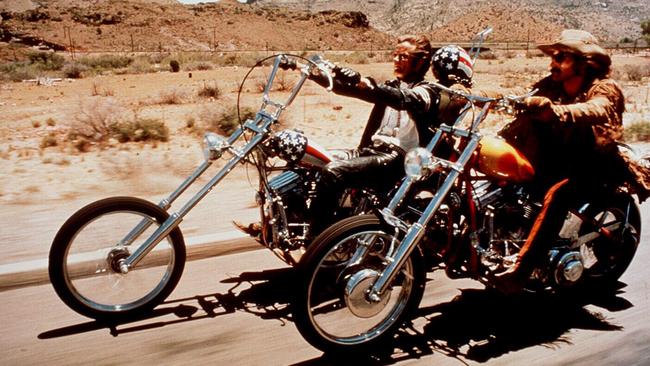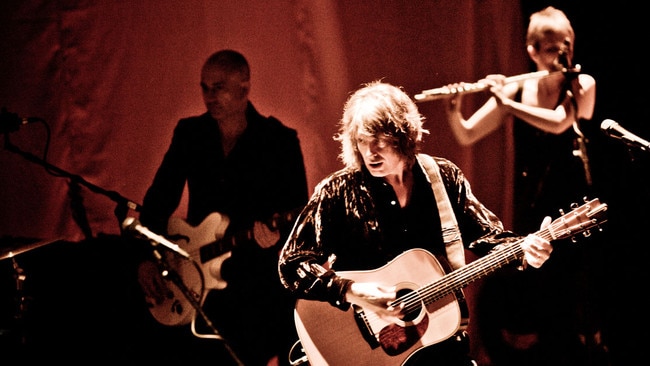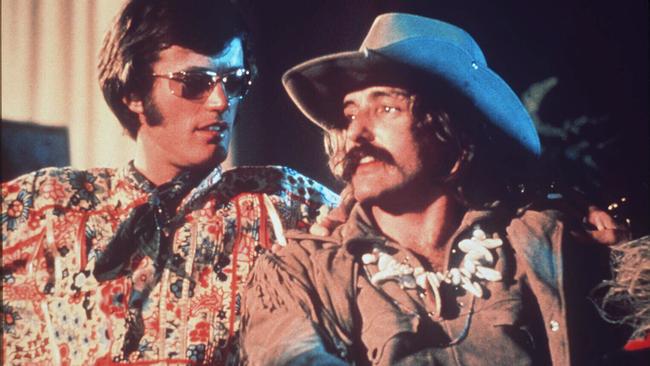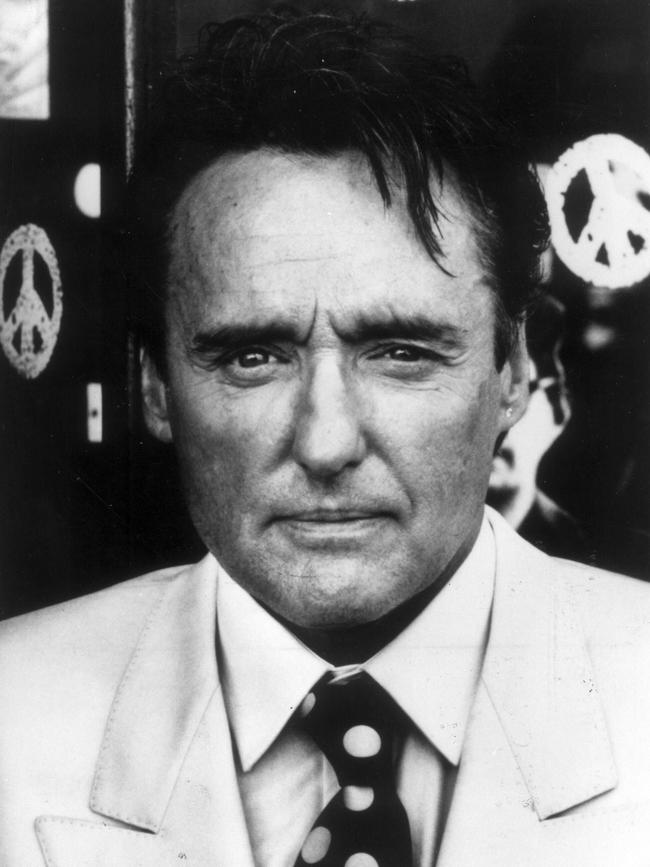Easy Rider star Dennis Hopper lived as a stoned Forrest Gump
British band the Waterboys has made an album about the odd and unpredictable late actor Dennis Hopper that features Bruce Springsteen.

It’s surprising more people haven’t done this already: an album about a person. Life, Death and Dennis Hopper is the Waterboys’ musical tale of a complex, rebellious and occasionally terrifying Hollywood outsider.
Hopper epitomised hippie freedom in the 1969 classic Easy Rider, threw it all away in 1971 with the disastrous The Last Movie, about a stunt man who thinks he has found paradise in Peru, and spent years in the wilderness before portraying a series of unhinged individuals not dissimilar from himself.
They ranged from a manic photojournalist in Apocalypse Now to a psychopathic gangster in Blue Velvet. An album about him is a great idea.
“He was a stoned Forrest Gump. He was there at key moments of the 20th century,” says Waterboys leader Mike Scott, best known for spiritually inclined epics such as Whole of the Moon and Fisherman’s Blues. “There was sufficient material in his life to generate the songs.”

The Edinburgh-born, Dublin-based 66-year-old wears a wide-brimmed fedora over his shaggy hair as we sit in a corner of the Groucho Club in Soho, London. Scott may have rejected rock’n’roll in the late ’80s to embrace unfashionable styles such as folk and country, but with his Jagger-esque lips and craggy features, he still looks like a rock star.
The seed for this record came from Scott seeing a show of Hopper’s photographs at the Royal Academy in 2014. Many dated from the mid-’60s when Hopper, who died in 2010 aged 74, was hanging out with Andy Warhol and documenting the emerging counterculture. A song on the album called The Tourist, Hopper’s nickname at the time, is based on the period.
“The photographs were mostly black and white and I loved his eye, what he captured. So much of his personality was revealed in the taking of the photographs. That got me interested in him,” Scott says.

Hopper was difficult, if brilliant. The second of his five marriages, to Michelle Phillips of the Mamas and the Papas, lasted eight days. He based Blue Velvet’s venomous, oxygen-huffing Frank on his drug-addled self in the 1970s. A song on the album called Blues for Terry Southern describes how the Easy Rider scriptwriter missed out on being rewarded for the vast success of the film after doing a handshake deal with Hopper when he should have been credited as co-writer.
“Now it feels like the two rednecks in the pick-up truck who shoot Billy at the end of Easy Rider are in the White House,” Scott says. “Who knew how deep those roots of authoritarian control went? We thought we pulled them out in the ’60s and ’70s. It turns out they were more embedded than we realised.”
The album is also a tale of hubris. “After Easy Rider he was invulnerable: nobody could have any influence on him,” Scott says. “He had total control of The Last Movie, with the result that he spent a year editing it at his house in New Mexico, on drugs, and got completely lost.”

A few high-profile friends pop up to help Scott on the album. American songwriter Fiona Apple, whom he got to know after she recorded a version of Whole of the Moon, came on board for Letter From an Unknown Girlfriend.
Bruce Springsteen, no less, narrates Ten Years Gone, a document of Hopper’s wilderness years in the 1970s. “I always loved the way Bruce tells stories on stage, and I did meet him once, so it seemed possible,” Scott says of convincing the Boss to participate.
“Bruce was ideal to narrate that period of Dennis Hopper’s life, when nobody would let him make a film but maverick directors like Wim Wenders and David Lynch were still casting him in theirs.”
You could compare this album to A Complete Unknown, James Mangold’s film about Bob Dylan. “I haven’t seen it because I don’t like biopics, but I see this as different,” Scott says.
“A film presents a story as reality. Songs only give an impression of reality.”
Scott met Dylan in 1985 at a jamming session at the north London studio of Dave Stewart, of the Eurythmics.
“Couldn’t have been nicer, although I’m sure he could be a bit of a bastard in the ’60s. I’ve smoked a joint that Bob Dylan rolled.”

Like Dylan, the Waterboys moved through genres, angering old fans and making new ones along the way. Formed in 1983, they became part of the Big Sound fostered by arena-filling acts such as U2 and Simple Minds. Then in 1988 they took a left turn with Fisherman’s Blues, an excursion into traditional Irish and Scottish music that was overflowing with fiddles, mandolins and Celtic mysticism. Having made records that used the expansive possibilities of ’80s studio technology, the Waterboys went traditional. It was a shock.
“Although some of the old fans didn’t like it, it became our biggest album,” Scott says. It was only after the next one (Room to Roam) that we ran into trouble. We lost the rock edge that was still there in Fisherman’s Blues. It was very mellow and people were disappointed.”
Was Scott upset at the reaction? “I felt the same way, funnily enough. The band imploded, we went from being a seven-piece to a four-piece, and I did feel we needed to get our rock sound back.
“But we had fallen in love with country and folk music, Hank Williams was our God, and playing fiddles and mandolins was jolly good fun because it was music you could make in a hotel room together. It took a long time to recover from that.” If Fisherman’s Blues was the Waterboys’ Easy Rider, Room to Roam was their The Last Movie.

I ask Scott about his favourite version of Whole of the Moon – apart from his own, of course. “I love Fiona Apple’s version. Prince played it at Ronnie Scott’s on piano not long before he died and I’d love to know what that was like. There is a gay disco version too, by an act called Boys of the New Age. That’s a monster.”
Did he know it would become a standard? “Not when I wrote it. By the time we produced the final mix, I could feel it might be a hit.”
Ultimately, Scott is a classicist. “Sketches of Spain by Miles Davis, What’s Going On by Marvin Gaye, All Things Must Pass by George Harrison, and Sticky Fingers by the Rolling Stones” are the albums he would grab if the house were on fire.
Will the Waterboys make a follow-up album on, say, Hopper’s Easy Rider co-star, Peter Fonda? “No, this is a one-off. Do you remember an album called Steve McQueen by Prefab Sprout?” he asks, citing a sophisticated pop classic from 1985.
“I remember being really disappointed that it wasn’t actually about Steve McQueen. It must have stayed with me.”
THE TIMES



To join the conversation, please log in. Don't have an account? Register
Join the conversation, you are commenting as Logout